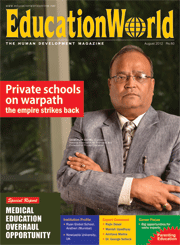 I read both your letter from the editor and cover story ‘Private schools on the warpath’ (EW August) with great delight. You have syste-matically demolished and laid bare the flimsy premises upon which the Central and state governments have proposed to load India’s beleaguered private schools with what in essence, is their responsibility. Truly, the road to hell is paved with good intentions.
I read both your letter from the editor and cover story ‘Private schools on the warpath’ (EW August) with great delight. You have syste-matically demolished and laid bare the flimsy premises upon which the Central and state governments have proposed to load India’s beleaguered private schools with what in essence, is their responsibility. Truly, the road to hell is paved with good intentions.
The history of two schools in Darjeeling, West Bengal lends credence to your story. A government boys school and a sister girls school established in 1879 when the first Earl of Lytton was viceroy of India, and boasting acres of land and impressive and extensive neo-Gothic colonial buildings, jointly have about 500 students. Both schools are free for day pupils, and boarders pay a nominal fee of Rs.1,916 per month. Both schools are affiliated with CISCE, New Delhi, and have highly qualified teachers whose salary bill aggregates Rs.1.5 crore per year. These schools can easily accom-modate an additional 1,000 students each, but even the free education they provide has few takers from local communities.
Admittedly, the right to education is fundamental. But so are the right to food, safe drinking water, and decent shelter. All these are justifiable entitle-ments. But surely, government should prioritise the order in which they should be provided?
Robindra Subba
Director, Himali Boarding School
Kurseong, Darjeeling
Sanctified cop-out
I read your enlightening cover feature ‘Private schools on the warpath’ (EW August) with great attention. Damodar Goyal deserves the gratitude of the nation for speaking up for private schools which are the last bastions of qualitative K-12 education in India.
Unwilling and unable to raise education standards in the country’s 1.25 million government schools, the ‘neta-babu kleptocracy’ has focused its attention on private schools, forcing the latter to partially discharge its obligation to provide free and compulsory education. Shamefully, instead of reprimanding the Cent-ral and state govern-ments for turning a blind eye to the shock-ingly low teaching-learning standards in government schools, the Supreme Court has sanctified this cop-out.
The reality is that private schools are well managed, offer superior quality education and serve as benchmarks for government schools. India’s 80,000 private schools have educated the entire middle class, the most productive segment of our society. The creeping nationalisation of private schools which will result in their being reduced to the level of government schools, is a very dangerous development for Indian society.
Ramesh Chandran
Mumbai
Alarming story
The special report detailing the many scandals in medical education (EW August) is shocking. Some of these scandals have also been showcased in the hit television show Satyamev Jayate, to the horror of the nation.
There was a time when the medical profession was considered noble, and doctors were believed to be divinely inspired. But corruption has tainted this profession severely. These days the primary objective of medical students seems to be to make money. Your statistics about sub-standard medical colleges being recklessly licensed by the Medical Council of India are alarming. The government should take immediate steps to cancel the licences of such colleges to stop the further quality deterioration of medical education. Over the past two decades MCI has transformed into a den of corruption and cronyism, with merit and transparency having no place in the council.
Former MCI president Ketan Desai who has several charges of corruption against him, must be dealt an exemplary punishment by the courts. The salvation of India is dependent upon politicians and administrators being unsparingly exposed and penalised.
This report is an eye opener. I thank EducationWorld for this excellently researched story.
Ritu Chopra
Bangalore
Deep rot
After reading your special report on the mess in medical education (EW August), I know why there is so much opposition within the medical fraternity to the dissolution of the Medical Council of India. MCI is a milch cow which allows office-bearers to make obscene amounts of money in exchange for granting favours to medical colleges.
The new council nominated by the Central government has done little to check corruption. CBI has filed charge-sheets against six medical colleges which received the approval of the new MCI board to increase capacity, despite being unqualified in terms of infras-tructure and faculty. The rot has seeped too deep for any meaningful reform to happen.
The sensible option is to disband MCI as per the recommendations of the proposed NCHRH Bill. It’s too broke to fix. It needs radical re-engineering.
Sanjay Tripathi
Delhi
Lok Ayukta imperative
Your editorial ‘little fear of law and order system’ (EW August) is excellent. I believe that the rules, regulations, laws, etc on statute books should be strictly applied to all political parties and politicians in accordance with the doctrine of equality of law. Unfortu-nately, this doctrine exists only on paper. Most politicians feel they are above the law. There is, in fact, a general impress-ion that legal punishment is only for poor citizens.
On the rare occasion when law is applied to politicians, the end result is mostly disappointing as evidence fails to impress the courts and they are acquitted. All cases against politicians cannot be false. Therefore the law, order and justice systems need to be comp-letely overhauled and the Lok Ayukta proposal pending with Parliament since 1969 should be speedily enacted.
Mahesh Kumar
Delhi